 |
Socio-Political Issues
Hillaire Belloc, the Liberal - Part I
‘Only Ill-Informed Catholics
Condemn the French Revolution’
Patrick Odou
This series will analyze Belloc’s position on the French Revolution and the Modern State. I based myself on several of his books, but principally on The French Revolution (New York: Henry Holt, 1911, 255 pp.)
The French Revolution, which Belloc wrote in 1911 when he was 41, is an apologia of that revolution. He is a clear admirer of the French Revolution. I believe that there are many errors from a Catholic perspective in this book. Here I will address only one, which is the principle thesis and contention of his work. Belloc tries to convince his readers that there was no conflict between the Revolution’s concepts of State and Religion and those of the Catholic Church.
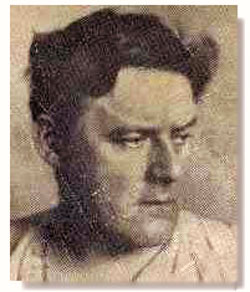
Hillaire Belloc supported the French Revolution's political theory |
Speaking as a Catholic, Belloc openly affirms that he is a supporter of the French Revolution’s political theory. He states: “If a personal point may be noted, the fact that the writer of these pages is himself a Catholic and in political sympathy strongly attached to the political theory of the Revolution, should not be hidden from the reader” (p. vii).
He seems to grant the same degree of credence to the political theory of the French Revolution that a Catholic attributes to doctrine of Holy Mother Church herself: “The political theory upon which the Revolution proceeded … is universal, it is eternal, and it is true” (p. 13).
He repeatedly states that, on an ideological level, there was no reason for the fight between the Revolution and the Church. Indeed he affirms that there would be “no conflict demonstrable between the theology of the Catholic Church and the political theory of the Revolution” (p. 224), which seems to be the exact opposite of the truth, as I will prove later in this article.
Further, he states that one “cannot call the Revolution a necessary enemy of the Church” (p. 222). Again, he pretends that “there was no quarrel between the theology of the Catholic Church and the political theory of the Revolution” (pp. 225-226).
Belloc belittles those who affirm the contrary as being ignorant, not rational and ill-equipped to address the matter. Indeed, he affirms: “We must, then, approach our business by asking at the outset the most general question of all: ‘Was there a necessary and fundamental quarrel between the doctrines of the Revolution and those of the Catholic Church?’ Those ill-acquainted with either party [the French Revolution or the Church], and therefore ill-equipped to reply, commonly reply with assurance in the affirmative” (p. 221). Further, he qualifies this opposition as “non-rational” (p.254).
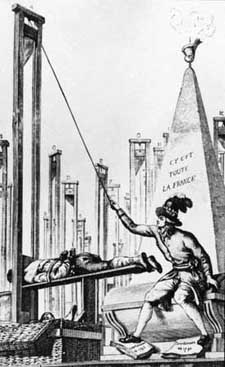
The guillotine took the lives of clergy and nobles faithful to the Church |
The more competent observers, he pretends, “cannot call the Revolution a necessary enemy of the Church” (p. 222).
Trying to explain the historic conflict that took place between the Revolution and the Church, Belloc points to secondary factors, such as the decadence of the clergy, its close ties with the nobility, the presence of Huguenots in France who inspired the fights against the Church, mistakes in judgment by the Revolutionaries, etc.
Then he affirms categorically that there is no opposition of principle between the Catholic Church and the French Revolution. There was just a “misunderstanding” that rose from coincidences and misconceptions:
“There was no quarrel between the theology of the Catholic Church and the political theory of the Revolution; but the folly of this statesman, the ill drafting of that law, the misconception of such and such an institution, the coincidence of war breaking out at such and such a moment and affecting men in such and such a fashion - all these material accidents bred a misunderstanding between the two great forces, led into conflict the human officers and the human organizations which directed them; and conflict once established feeds upon, and grows from, its own substance” (p. 225).
It is my opinion that in proposing such a thesis, Belloc falsifies reality, since the Catholic Church has always taught the opposite concerning the French Revolution, the philosophy that inspired it, the Enlightenment, and the religion that was behind it, Deism.
This I proceed to prove with documents of the pontifical Magisterium.
Pius VI: An uninterrupted sequence of impieties…
That the revolutionaries were enemies of the Catholic Religion – contrary to the claim of Belloc – is clear from the words of Pius VI, who reigned at the time of the French Revolution. He described it with the following words:
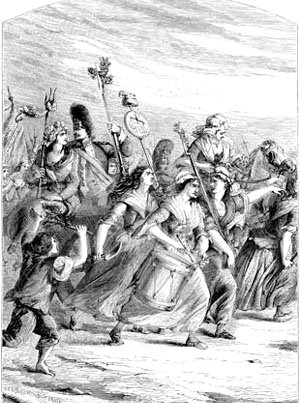
Revolutionary hordes forced the royal family back to Paris to be killed |
“The most Christian King Louis XVI was condemned to death by an impious conspiracy, and this sentence was executed. We remind you in a few words the dispositions and reasons for that sentence. The National Convention had neither the right nor the authority to pronounce that sentence. Indeed, after having abolished the monarchical form of government, which is the best, it transferred all public power to the dominion of the people …
“Celebrating the fall of the Altar and the Throne as a triumph of Voltaire, one exalts the fame and glory of all impious writers who appear as generals of a victorious army. After using all kinds of ploys to draw a large number of the people to their party … the partisans [of the French Revolution] manipulated the specious word Liberty. They raised it up like a trophy and invited the multitudes to gather under their banners which were displayed everywhere.
“Here, in truth, is this philosophical liberty that tends to corrupt minds, degrade customs, and raze all laws and institutions …
“After that uninterrupted sequence of impieties which had their origin in France, what man could doubt that one should blame this hatred of Religion on the intrigues and plots that today disturb all of Europe? No one can deny that it was this same cause that provoked the tragic death of Louis XVI” (1).
Pius IX: Philosophers who reject the truths of Revelation…
Pius IX attacks the philosophy that inspired the French Revolution as well as its unbalanced cult of reason - not a simple misunderstanding as Belloc supposes. In his Encyclical Qui pluribus, he states:
“In order to more easily mislead the people into error, deceiving in particular the imprudent and the inexperienced, they [the revolutionaries] pretend that they alone possess the secret of prosperity. They claim for themselves without hesitation the name of philosophers, as if philosophy, which is wholly concerned with the search for truth in nature, should reject those truths which God Himself, the supreme and most clement Author of nature, has deigned to manifest to men by His singular goodness and mercy so that mankind may attain true happiness and salvation.
“Hence, by means of distorted and fallacious arguments, these enemies never stop invoking the power and excellence of human reason. They raise it up against the holy faith of Christ and spread everywhere with great foolhardiness that this faith is opposed to human reason. Without doubt, they could have devised nothing more senseless, impious, and opposed to reason itself. For although faith is above reason, there is no real opposition or discord whatsoever between them, since both proceed from the same greatest source of eternal and unchanging truth, God” (2).
Gregory XVI and Pius IX: Liberty of conscience is a delirium
Liberty of conscience and liberty of religion, demands introduced by the French Revolution, were also condemned by Pius IX in his Encyclical Quanta cura:
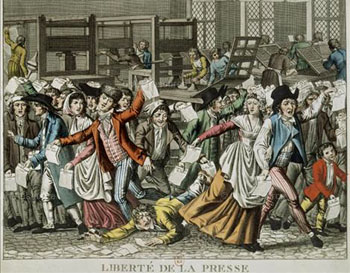
The Church opposed the revolutionary freedom for error to be printed and spread |
“Departing from this totally false idea of social government [that the State should be indifferent regarding religion], its propagators fearlessly foment the erroneous opinion, most fatal in its effects on the Catholic Church and the salvation of souls, which our predecessor Gregory XVI .... called ‘a delirium’ (Mirari vos), that is, that ‘liberty of conscience and worship is an inalienable right of the individual, which should be legally proclaimed and established in all rightly constituted societies; and that citizens have a right to an absolute liberty which should be restrained by no ecclesiastical or civil law; whereby they may openly and publicly manifest and state any of their ideas whatsoever, either by word of mouth, by press, or in any other way.’
“But, while they rashly affirm this, they do not realize and consider that they are preaching ‘liberty of perdition’ (St. Augustine, Epistle 105, al. 166),and that ‘if human arguments are always allowed free room for discussion, there will never be wanting men who will dare to resist truth and to trust in the verbosity of human wisdom. Whereas we know, from the very teaching of Our Lord Jesus Christ, how carefully Christian faith and wisdom should avoid this most injurious drivel’ (St. Leo, Epistle 14, a. 133)” (3).
Pius XII: FR and the modern world share the pride of Satan…
Mentioning the French Revolution indirectly, Pius XII also condemned it and its fruit - the Modern State - as a manifestation of pride which shares that of Lucifer. That is, he condemns the political theory the Revolution advocated - and Belloc supported - as being opposed to religious principles. He states:
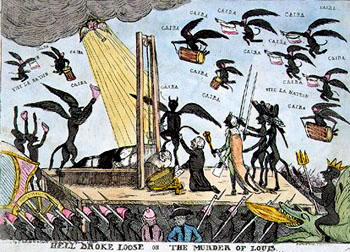
A cartoonist shows Satan, bottom right, commanding the beheading of Louis XVI while the devils celebrate |
“In the same way that it [the modern world] tried to throw off the suave yoke of God, it simultaneously repudiated the order He established and, with the same pride of the rebellious Angel at the beginning of Creation, tried to institute another order according to its own will. After almost two centuries of sad experiments and missteps, all who are still of upright heart and mind confess that any such dispositions and impositions – those which have the name but not the substance of order – did not give the results they promised and do not correspond to the natural hopes of man” (4).
Pius XII was most probably referring here to a well-known text of Cardinal Louis Billot, the intellectual adviser of St. Pius X, that qualified the French Revolution as satanic:
“The essentially anti-religious character and the impiety of the principle of Liberalism will be clear to the eyes of anyone who realizes that, properly speaking, this Liberalism is the source of the Great Revolution, which is rightly said to present so expressly and visibly a satanic character, so as to distinguish it from anything else seen in past times” (5).
Conclusion of Part I
It seems to me quite difficult to assert that these four Popes, along with Cardinal Billot are all ill-informed about the French Revolution, as Hillaire Belloc pretended.
Instead, it is much easier for me to conclude that Belloc’s general acceptance of the French Revolution qualifies him as a liberal. Such general acceptance is included in the mentioned papal condemnations.
1. Pius VI, Allocution to the Consistory of June 17, 1793, Rome: Typis S. Congreg Propaganda Fidei, 1871, vol. 2, pp. 17, 25-26, 29-30;
2. Pius IX, Qui pluribus, November 9, 1846, Recueil des Allocutions..., Paris: Adrien le Clere, 1865, pp. 175-177.
3. Pius IX, Quanta cura, December 8, 1864, Recueil... pp. 5-7.
4. Pius XII, Radio-message of Christmas 1949, Petropolis: Vozes, 1952, p. 28.
5. Louis Billot, Les principes de 89 et leurs consequences, Paris: Tequi, p. 30.

Posted July 11, 2008

Related Articles of Interest:
 Belloc the Liberal - Part II: His Attachment to Rousseau Belloc the Liberal - Part II: His Attachment to Rousseau
 Belloc the Liberal - Part III: He Supports the French Terror Belloc the Liberal - Part III: He Supports the French Terror
 Distributists Misleading Their Audience about Capitalism Distributists Misleading Their Audience about Capitalism
 A Distributist Manifesto Spiced with Communism A Distributist Manifesto Spiced with Communism
 Socialism and Distributism in Catholic Clothing Socialism and Distributism in Catholic Clothing
 Eric Gill, a Precursor of Vatican II Eric Gill, a Precursor of Vatican II
 The State of Mind that Generated the Revolution The State of Mind that Generated the Revolution
 Liberals, Moderns and Progressivists Liberals, Moderns and Progressivists
 Unmasking the Formidable Myth about Queen Marie Antoinette Unmasking the Formidable Myth about Queen Marie Antoinette
 Revolution and Counter-Revolution: Historic Overview Revolution and Counter-Revolution: Historic Overview

|
Social-Political | Hot Topics | Home | Books | CDs | Search | Contact Us | Donate

© 2002- Tradition in Action, Inc. All Rights
Reserved
|
 |
|